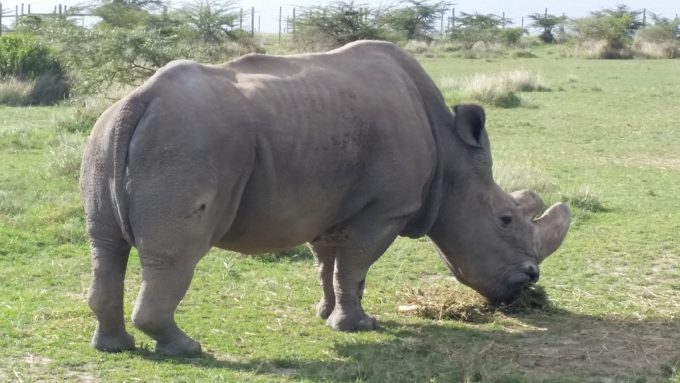
Working in the news business I feel so bombarded by news events that, sadly, I sometimes turn off and become indifferent to it all – earthquakes, planes crashes, floods, bombs, terror attacks, ships sinking…
Then there is a news story that unexpectedly jumps out and hits me…the death this week of Sudan, the last male white Rhino, was one such news story. Sudan’s death seems to symbolize for me the end of an era…
Since I am lucky enough to have seen a couple of white rhinos up close and in person, I want to share a little story from my teenage years when my family was living in Kenya.
During one Christmas vacation we went on a safari to the Masai Mara game reserve with the Macgillivray family from Canada. Mrs. Macgillivray was head of the athletic department at my school, the International School of Kenya, and she and her husband had three young children.
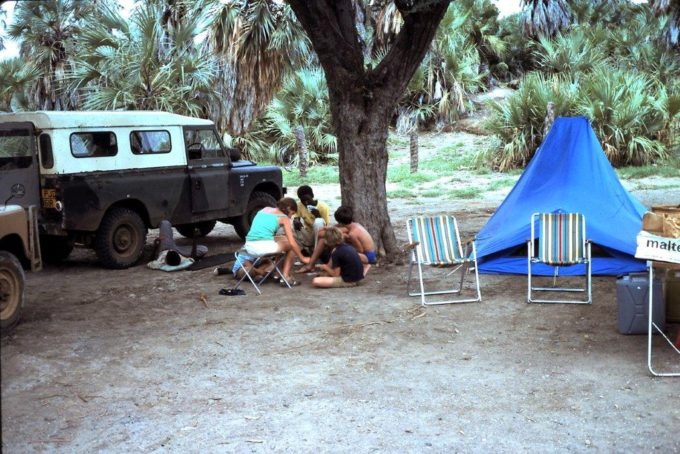
In the Masai Mara reserve we found a camp site under a big tree about a half mile down the road from a Forest Ranger’s cabin and near an area where armed guards stood watch over two White Rhinos 24/7. Already in 1978, the white rhinos were at great risk of being killed by poachers eager to cut off their horns for use for medicinal purposes, primarily made into a powder to be used as an aphrodisiac.
My family had to head back to Nairobi earlier than the Macgillivray’s and I stayed on with them to help take care of their three children.
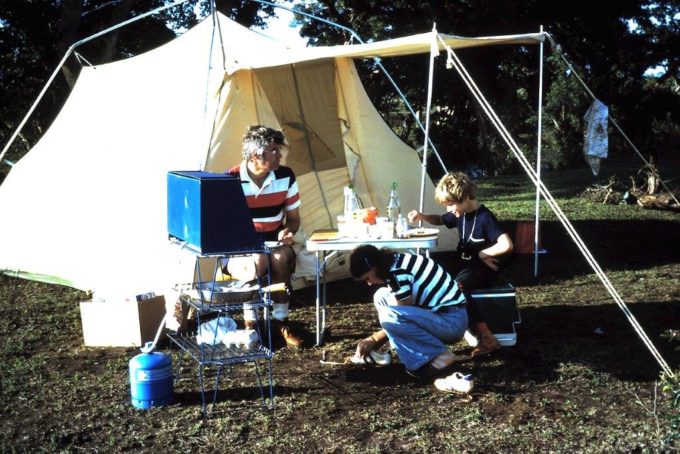
I went with the Macgillivray’s to visit the nearby area where two white rhinos were grazing under careful watch of their armed guards. I remember wondering if it was really necessary for all these armed men to be dedicated to these two big animals. Were there really evil poachers sneaking around in the bush ready to kill them? (the answer to that has proven to be yes!)
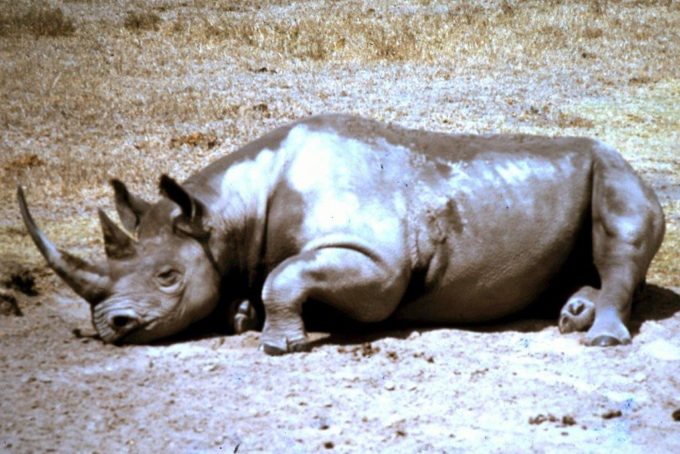
That evening after dinner, we were seated around the campfire when we heard rustling and grunting in the bushes. Suddenly, one of the white rhinos came plowing through the bush, lumbering through our campsite and off in the dark into the grasslands on the other side.
We were momentarily perplexed and then the eminently cool Mrs. Macgillivray handed me a flashlight and said, “why don’t you walk down to the Forest Ranger’s cabin and let the ranger know that the guards must have fallen asleep and now the white rhino has wandered off. We’ll get the kids to bed.”
Back then things were different – there were no cell phones, internet, email, Facebook, Instagram or twitter. We weren’t going to try to get a selfie with the rhino or tweet about his wandering. And back then everyone, like Mrs Macgillivray, was much more cool, calm and collected.
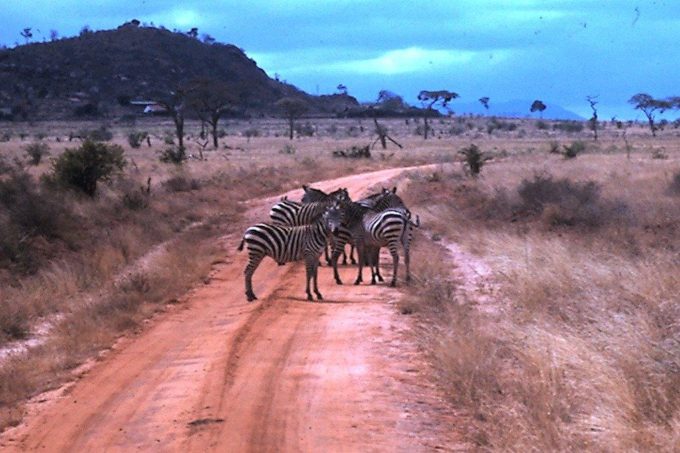
I took the flashlight and started down the orange-dirt road to the Ranger’s cabin. I remember I could see the stars but otherwise it was quite dark. I could not hear any rhino snorting or rustling. My feet in my sneakers made soft shuffling noises in the dirt. I wondered if I might get charged by the rhino – who had not looked particularly aggressive – or perhaps pounced on by a lion. I tried to be eminently cool myself and walked quickly but did not run.
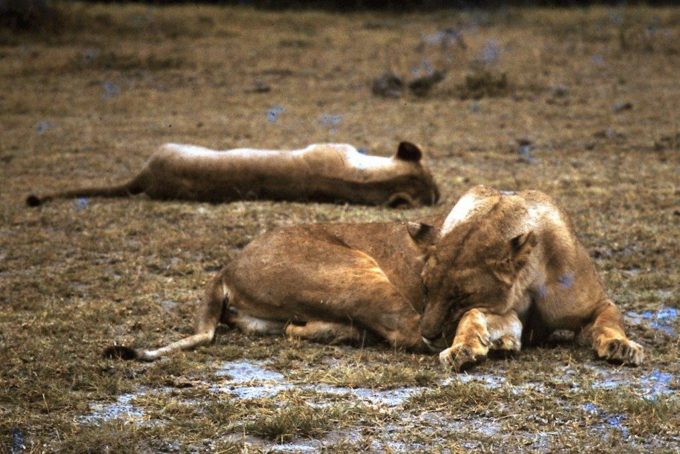
Finally, with a twinge of relief, I arrived at the cabin. The Ranger was surprised and perhaps slightly irritated to see this young girl show up. It took me a few minutes to communicate what had occurred. He was not enthusiastic about having to go out and find the missing rhino at night, but eventually he got his gun and the keys to his land rover and we headed out. I made my way back the half mile to our campfire.
Later we could see from our campsite two land rovers with their headlights on driving around the savannah trying to herd the poor rebellious rhino back to his sanctuary area.
Yes, those were the good ‘ol days when I was 13, no cell phone, just a flashlight, and a touch of spunk.
But back to Sudan…
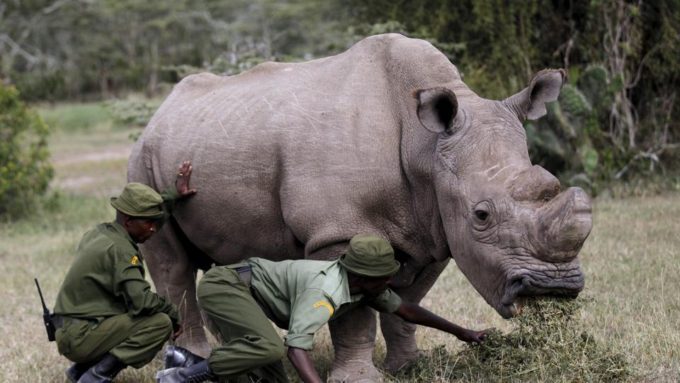
His caretaker James Mwenda gave him a touching tribute…
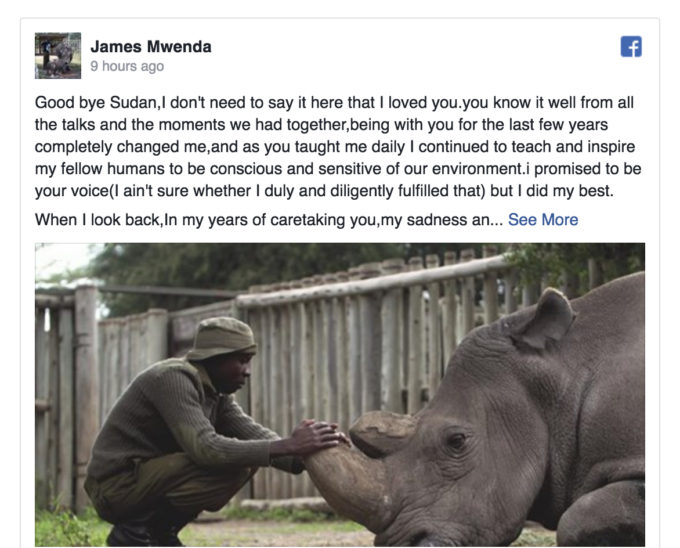
“Good bye Sudan,I don’t need to say it here that I loved you. You know it well from all the talks and the moments we had together, being with you for the last few years completely changed me, and as you taught me daily I continued to teach and inspire my fellow humans to be conscious and sensitive of our environment. I promised to be your voice (I ain’t sure whether I duly and diligently fulfilled that) but I did my best.
When I look back, in my years of caretaking you, my sadness and the essence of losing you is overcome by a contentment that I gave you all the best. Sudan I don’t regret anything as deep within my heart I gave you everything.
What I regret most, is whether my fellow humanity has learned from your existence. I tried as much to help them hear you through my thoughts and the lessons I learned through our personal day to day life, though still my voice has been small, I have testimonies that you have left an imprint in the hearts of many especially those I interacted with.”
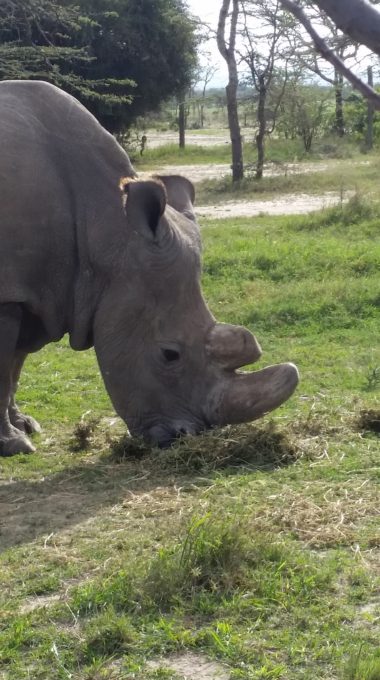
RIP SUDAN!
I feel so lucky to have seen a spectacular white rhino like you before it was too late.
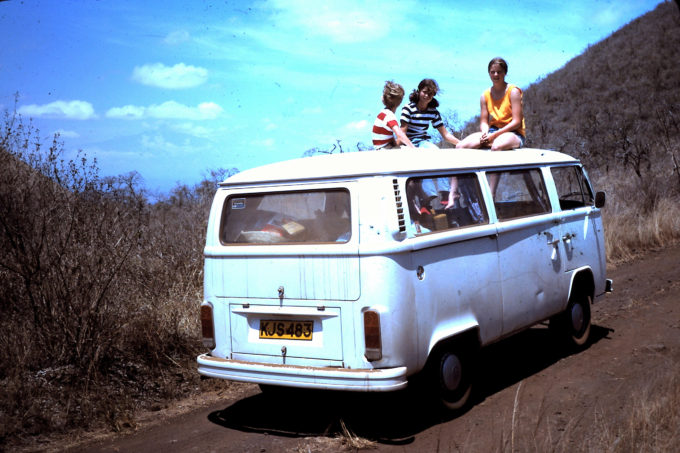
If you are interested in other posts on those years in Kenya, check out:
The Missing Pocket Watch and the Thorny Situation
My Lost Opportunity to Become a Princess

Your story touches me deeply. thank you for sharing, it reminds us that nothing stays forever. We should value more life and nature.
I couldn’t agree more Juliana, we need to value more our own lives, love more the people around us, and appreciate the beauty of this incredible planet on which we live.
Hi Trisha,
Greetings. I hope all is well with you and yours. What a wonderful post. What a fitting tribute to a magnificent animal and his devoted caretaker. When I started hearing about Sudan, I felt so sad. It became clear that the species was nearing its end. It is hard to believe that rhinos have survived for millions of years, but mankind has all but wiped them out. I saw a photo of Sudan being hugged by his caretaker just after Sudan had died. God, what a sight. Thank you for this lovely and insightful post.
Hi Adri — Always wonderful to hear from you. Yes, the photos and words of his devoted caretaker just broke my heart too. I just decided to contribute some money to the Ol Pejeta Conservancy to support their work. I am not optimistic about IVF working to get a new baby white rhino, but maybe they can save some other animals.
Trisha, thank you so very much for this wonderful reflection. I felt a pain in my heart when I heard the news of Sudan’s death, then a fierce hope when the report included the fact that they have kept some of his DNA and semen, hoping for an IVF pregnancy. Apparently, in his years in the game preserve nothing ever clicked between him and the two white rhino females there. Maybe he was already so sad about the end of his species that he didn’t want to prolong the pain and pass it on to a child. But of course, it would take more than one child to ensure a future. . . .
There is a new TV show here, of the Bronx Zoo’s endeavors to save endangered species through many means, including “blind dates” in their acreage. I find it hopeful, and in these times, hope is precious.
Thanks for the pictures, the account of your adventure, and the journey back to a time when things might have been able to change . . .
Yes indeed, hope is precious. I seem to be tackling a lot of topics these days that make me blue — human trafficking, animal extinction — and then there are so many more things to bring us down — school massacres, terror attacks, hatred and indifference. Sigh. As we head towards Easter, let’s hope we can find something to lift out spirits.
Thanks so much for this story. I have experiences and memories – of safaris and rhinos – that very closely parallel yours, and I – like you – consider myself so very fortunate to have been there, then… close enough to sense and even touch these amazing animals. I am sad beyond belief at the bleak future they face, and that they may actually be only a hair’s breadth from extinction. Still hoping for some kind of miracle, I guess. Salama, Trisha.
Hege — I am glad you also had a chance to see – and touch – a rhino. I wish we could all do something more to stop this terrible direction the world seems to be heading in.
I am sobbing buckets right now….
I am sobbing buckets right now….
I am too and feeling hopeless for the beautiful diversity of our planet. Too many people on this planet and too much greed.
It is so discouraging and I am not sure what to do.
I do not wish to appear trite Trisha but the end of an era doesn’t begin to tell the story. The fat controllers of the planet are hell-bent on destruction as the planet plunges pass the point of no return. We have moved beyond the tipping point of anthropogenic climate disruption and the greatest mass extinction in this planets history is well under way. In some ways I’m glad I’m the age I am (selfish I know) as I won’t have to face and deal with what is coming.
It breaks my heart, but I think you may be right.
Thank you for sharing that lovely photos from your time in Kenya. I still have the carved animals from the Kisii tribe. Sudan was a beautiful treasure. Thank you for sharing him with all of us. Each day is a gift!
You are right Cyndy, each day is a gift. Thanks for reading my blog and sharing your thoughts.
Hi Trisha,
Seems my comments that I made with tablet don’t show up since this is second time I’ve tried. Back on computer now so will try again.
I know I said that I think your life when you were young helped to make you into the adventurous reporter you are now. Also I commented on how appropriate it seemed to include the message that Sudan’s caretaker wrote. Thanks for another great and touching story.
A presto, Joan
Thank you Joan, you are alway so supportive and positive. I really appreciate it.
Your post fills me with joy and sadness. Joy for the the opportunity of having lived in Kenya and having so many wonderful safaris. What happy days! Sadness at the knowledge that the Kenya we knew is disappearing (has).
What a brave little girl to walk off alone in the dark of a game reserve.
Thanks for the thoughts and memories.
Love,
Dad
Those were the good old days!!